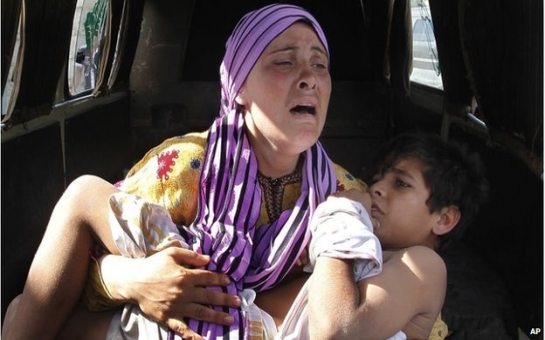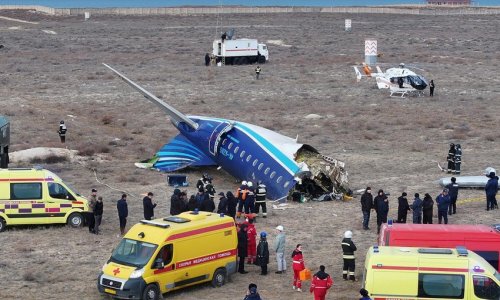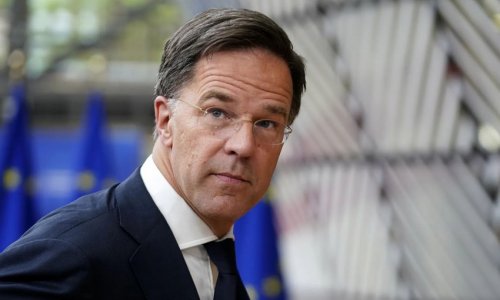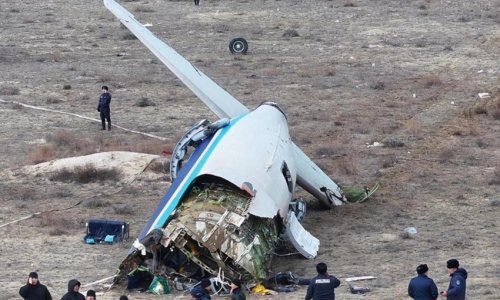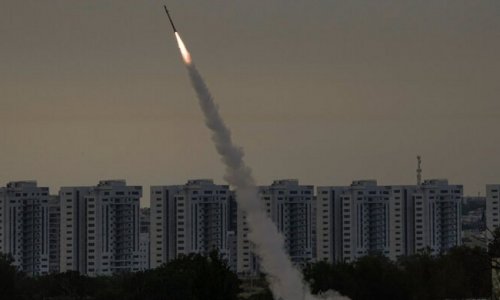By Jeremy Bowen
(BBC) - The teacher, quite a young woman, was neatly dressed in a long coat and skirt, with her hair covered by a plain, tightly wrapped white scarf.
She doesn't want me to identify her because it could lead to trouble. She works at a school in Qaboun, a suburb of Damascus that is controlled by a rebel faction loyal to the Free Syrian Army.
I managed to cross from government-controlled Damascus to meet them last summer. Their commanders were bearded, pious Muslims who said they condemned the brutality of the jihadists.
They said they were prepared to die to destroy President Bashar al-Assad and his regime, and wanted to build a state modelled on 21st Century Turkey, under a government with a distinct Islamist flavour.
Playground deaths
I could see the teacher was working hard to keep her voice steady as she described what happened when two bombs hit her school last week during morning break.
The 15 who died and the others who were horribly injured were all boys because it was their turn to go out to play in the warm autumn sun.
The teacher, a devout Muslim, was saying the prayer for those who are about to die as the smoke cleared and she saw the boys she had sent out for their break lying dead, dying or injured near the school entrance.
After the first explosion, far enough away not to hurt them, they had been running to get inside as they had been taught.
She had sent two 11-year-olds out of the class earlier that morning for being disruptive. They could not read or write because they had missed four years of school. They lay dead on the playground together, and later that day were buried side by side.
The teacher told me she still hadn't cried, although sometimes she shakes with cold.
"What have the children done to deserve this?" she said, in a voice that was never raised, but always full of anger. "They don't have weapons."
She said she did not know who fired the fatal shells. Like many Syrians, she has been disgusted by behaviour on every side of the war.
"It's President Assad's duty to leave the children out of this war. He needs to stop shelling the schools - but both sides need to stop attacking the children. They have nothing to do with this war. Adults started the fighting - and they can carry on - but they can't use their children to further their aims."
'Dinosaur era'
Is there a way to end the war in Syria? Not at the moment, or in the foreseeable future.
That is extremely bad news for the teacher, and every Syrian caught in the nightmare of a fourth year of bloodshed.
The UN estimates that nearly 200,000 people have been killed. Almost 11 million Syrians, virtually half of the population, have been forced to leave their homes. Of those, more than three million have fled the country.
In the year or so after a series of local uprisings in March 2011 escalated quickly into a shooting war, President Assad's opponents hoped it would end with the rapid collapse of the system that his father had established in 1970.
Presidents in Tunisia, Egypt and Yemen had been forced out. In Libya, Muammar Gaddafi had been killed.
President Assad was never as unpopular as the leaders who were deposed in 2011, but many Syrians were fed up with repression and corruption.
He had enemies, and at first demonstrators called for the reforms that he had often promised and never delivered - and sometimes were shot by the security forces.
But President Assad has survived, and that would have been impossible without a degree of popular support. For his supporters, and others who just wanted a quiet life, the so-called "Arab Spring" has been a cruel joke.
About six weeks ago the Syrian army recaptured Adra, a satellite town outside Damascus. Many supporters of the president lived there, mostly people with state jobs who had been given cheap housing as a perk.
Adra was damaged badly in the battle to eject a coalition of armed rebels, dominated by the Nusra Front, an al-Qaeda affiliate.
Mohammad Raja Mahawish, a 40-year-old surveyor, was held in the cellar of his block of flats with his wife, children and 60 others for 22 days after the rebels seized the town almost a year ago.
Standing in the dank basement room where he was effectively imprisoned, Mahawish condemned the uprisings of 2011.
"The Arab Spring," he said, "was used to fool people and caused a lot of problems in our country. Householders lost their properties, so did factory owners, people who were dreaming of a bright future for their children, good schools, university degrees, marriage, all gone… During these last three to four years, we were taken back to the dinosaur era."
Even the dinosaurs, he said, were more civilised than the rebels. Before he left Adra with his family and neighbours, Nusra and its allies, he said, had imposed a reign of terror.
"Imagine being in a situation where at any time someone can kill you, your children and your wife, or rape her."
Soldiers' loyalty
President Assad has had some bad moments. He has lost control of large swathes of the country. But his regime has been surprisingly resilient.
It has had military, diplomatic and financial support from Iran, Russia and the Lebanese Hezbollah movement. But just as importantly, it has kept the support of most of Syria's minorities and enough of the majority Sunni Muslims to survive.
That has helped deliver the loyalty of most of the armed forces, another crucial factor. Wholesale defections were often predicted in the first few years of fighting, but never happened.
In the warren of passages, sandbagged walkways and burnt-out cellars on the front line in Damascus, battle-hardened Syrian soldiers fight a war of attrition with armed rebels.
Capt Yaroub Issa, commander of a special forces unit, reeled off where he had been - a year-and-a-half in Idlib, Khan el Asal and Aleppo for seven months, and the suburbs of Damascus for the last 16 months.
The soldiers echoed the voices of the regime. A man in combat gear wearing a black full-face balaclava, on guard at a spy hole in a wall of sandbags facing rebel positions 10m (33ft) away, blamed a foreign conspiracy for Syria's troubles - just like President Assad.
"The country was running just fine," he said. "Their aim is simply to divide Syria into parts to help Israel. We are against this plan and conspiracy, we will keep resisting until our last drop of blood."
He brushed my words aside when I told him that I'd met rebel fighters in the positions facing him, in Qaboun, who had said that they were fighting for freer lives.
"These people have been fooled, they've been brainwashed under the veil of religion, and they use it as an alibi."
What is important is not the truth or otherwise of his views - which I have heard from many other Syrian soldiers in other places.
The point is that Yaroub Issa and other soldiers believe in the regime enough to be prepared, in the fourth year of war, to fight, if necessary, to the death.
Opposition divided
Many of the Syrian officers I've met have been Alawites, from the president's own sect. But in every unit there have also been Sunnis.
The regime has been stronger than many expected, which has helped it to survive. But another reason for the long war has been the disunity of the rebels.
An effective and influential alliance of secular, moderate Islamist rebels never emerged. They blamed the West for failing to support them properly. But they were never able to come up with a coherent way to appeal to millions of Syrians locked in their own personal struggles to survive the war.
President Assad's message has been consistent. He argued from the start that the uprising against him was a foreign conspiracy, a cynical alliance of jihadists and friends of Israel who wanted to destroy the Syrian state because it had dared to defy them.
The president's version of events was rejected and ridiculed by countries who demanded his removal, including the US, Britain, France and Saudi Arabia.
But as jihadist groups turned on more moderate rebel forces, and began to dominate the fight against the regime, his argument that Syrians had a choice between his secular regime and religious extremists seemed more convincing at home.
Opponents of the regime say that he worked from the beginning to create the stark choice between the regime and the jihadists, the reality he claimed existed from the start of the fighting.
His method, they say, was to target more moderate rebels and keep the pressure off the jihadists, first from al-Qaeda and now from the group that calls itself Islamic State.
The UN has another ceasefire plan, but it is at a very early stage. Diplomatic attempts to stop the war, or even slow it down, have failed. Syria's connections with the rest of the Middle East, and the rivalries of big powers left no room for diplomacy.
Syria never had a straightforward civil war. But now it is at the centre of an international conflict.
All of Syria's neighbours have become involved, in one way or another. One person in four in Lebanon is now a Syrian refugee.
The fighting here has merged with a renewed sectarian war in Iraq.
The regional superpowers are involved, Iran for the government, Saudi Arabia against it.
The Russians support President Assad, and the Americans, now bombing the jihadists, oppose him.
The war is changing, morphing into an even more grotesque shape, but it shows no signs of ending.

